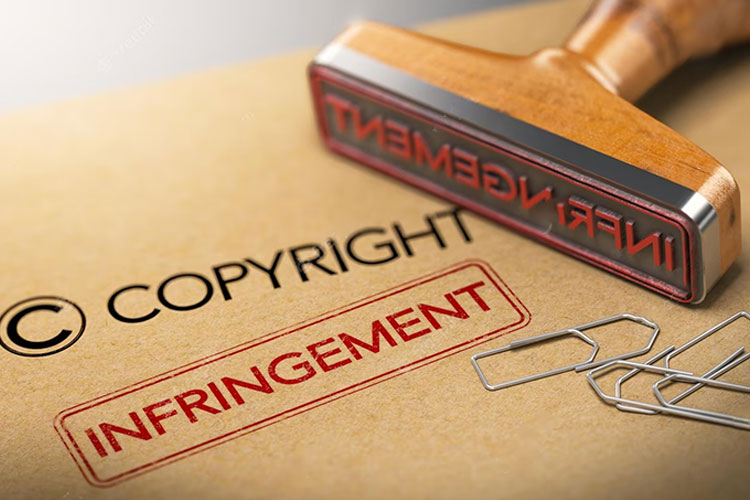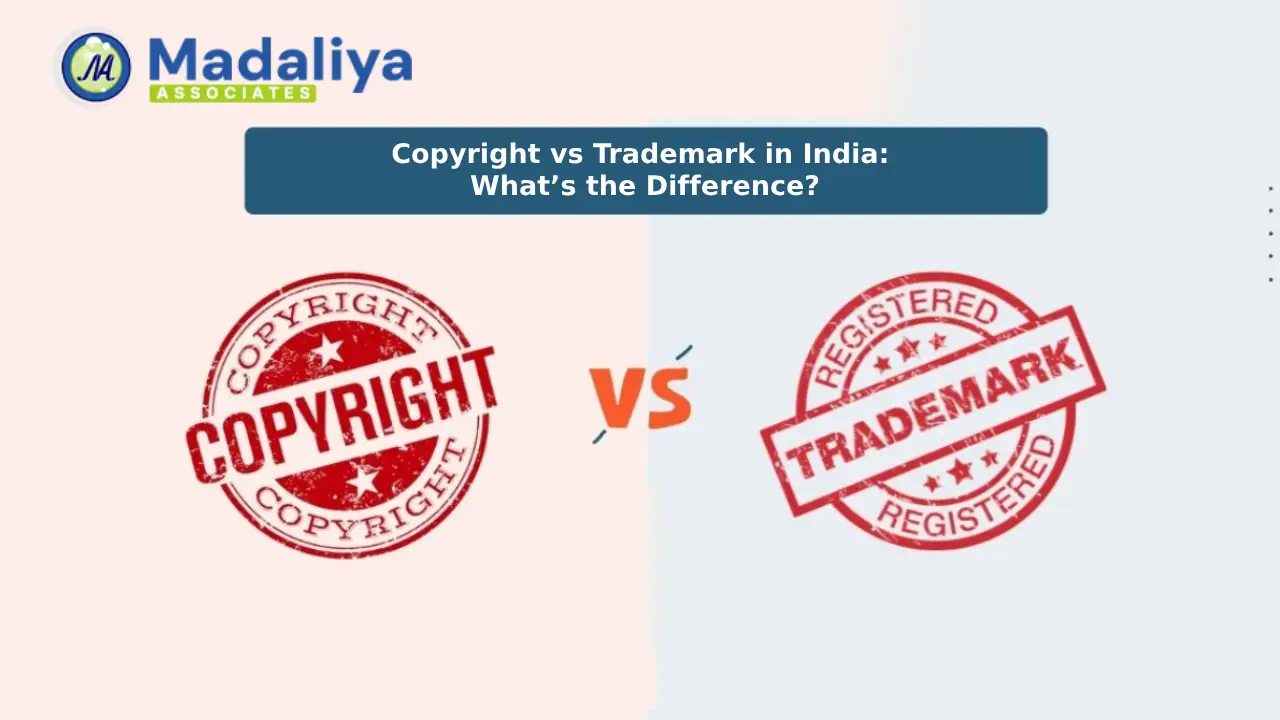

In today’s digital and entrepreneurial age, protecting intellectual property is crucial. Yet, many creators, businesses, and startups often confuse copyright with trademark. While both are forms of intellectual property rights, they serve distinct purposes under Indian law. This comprehensive blog will help you understand the difference between copyright and trademark in India, including their definitions, registration processes, legal protection, duration, and more.
What is Copyright in India?
Copyright is a legal right granted to the creator of original literary, dramatic, musical, artistic works, and cinematograph films and sound recordings. In India, the Copyright Act, 1957 governs these rights.
Key Features of Copyright:
- Protects creative expression but not the idea or concept itself.
- Automatically comes into effect when the original work is created.
- Copyright registration is optional but highly recommended for legal protection.
- It gives the owner exclusive rights to reproduce, distribute, perform, or display the work.
Examples of Copyrighted Works:
- Novels, poems, and scripts
- Paintings and drawings
- Music and lyrics
- Films and documentaries
- Software code and databases
What is a Trademark in India?
A trademark is a unique symbol, word, phrase, design, or combination that distinguishes the goods or services of one business from another. It is governed by the Trade Marks Act, 1999 in India.
Key Features of Trademark:
- Protects brand identity in the market.
- Must be distinctive and not generic or deceptive.
- Requires registration for full legal protection.
- Can include logos, brand names, slogans, packaging styles, etc.
Examples of Trademarks:
- Brand names like “TATA” or “AMUL”
- Logos like the Nike Swoosh
- Taglines like “Just Do It”
- Product packaging with unique design elements
Copyright vs Trademark in India: Key Differences
| Aspect | Copyright | Trademark |
|---|---|---|
| Governing Law | Copyright Act, 1957 | Trade Marks Act, 1999 |
| Protection Scope | Creative works: books, music, films, art, software | Brand identity: logos, names, symbols, slogans |
| Registration | Not mandatory (but advisable) | Mandatory for strong legal enforcement |
| Ownership | Creator or author | First user or registrant in commerce |
| Validity Period | Lifetime of author + 60 years | 10 years (renewable indefinitely) |
| Purpose | Protects original expression | Protects brand distinction in the market |
Why Register a Copyright in India?
While copyright exists automatically, registration offers legal advantages such as:
- Proof of ownership in court cases.
- Ability to license the work for commercial use.
- Deters plagiarism and unauthorized use.
- Helps with enforcement in copyright infringement cases.
How to Register Copyright in India:
- Visit the official Copyright Office website.
- Fill out Form XIV and submit the required documents.
- Pay the prescribed fees based on the type of work.
- Receive an acknowledgment number and wait for scrutiny and approval.
Why Register a Trademark in India?
Trademark registration is crucial for protecting your brand’s reputation and commercial identity. Some reasons include:
- Legal protection from brand imitation.
- Builds trust with customers.
- Grants exclusive rights to use the mark nationwide.
- Enables legal action in trademark infringement cases.
How to Register a Trademark in India:
- Conduct a trademark search on IP India’s public database.
- File Form TM-A with necessary documents.
- Submit a power of attorney (if an agent is filing).
- Pay the official filing fee.
- Monitor application for examination reports and oppositions.
- Receive your Trademark Registration Certificate.
Legal Protection: Copyright vs Trademark
Copyright Infringement in India
Occurs when someone copies, reproduces, or distributes copyrighted work without permission. Legal actions can include:
- Injunctions
- Monetary compensation
- Seizure of infringing copies
- Criminal penalties (in some cases)
Trademark Infringement in India
Takes place when a party uses a similar or identical mark that causes confusion among consumers. Legal remedies include:
- Cease and desist notices
- Lawsuits for damages
- Orders for removal of infringing goods
- Criminal charges in cases of counterfeiting
Which One Do You Need: Copyright or Trademark?
It depends on the nature of your work or business. Here’s a simple guide:
| Type of Work | Apply For |
|---|---|
| Writing a book | Copyright |
| Creating a logo | Trademark & Copyright |
| Launching a product brand | Trademark |
| Developing software | Copyright (for code) and optionally Trademark (for brand) |
| Filming a video | Copyright |
Duration of Protection
Copyright Duration in India:
- Literary and artistic works: Author’s lifetime + 60 years after death
- Cinematograph films and sound recordings: 60 years from publication
Trademark Duration in India:
- 10 years from the date of application
- Can be renewed indefinitely every 10 years with a small fee
International Protection: A Key Consideration
If you are planning to expand globally, you should also be aware of:
- Berne Convention for international copyright protection
- Madrid Protocol for international trademark registration
Both treaties allow Indian citizens to protect their IP rights internationally with a streamlined application process.
Important Focus Keywords Used in This Article:
- Copyright vs Trademark in India
- Difference between copyright and trademark
- Copyright registration in India
- Trademark registration in India
- Intellectual property protection in India
- Trademark vs copyright for logo
- Copyright infringement India
- Trademark infringement India
Conclusion: Know Your Rights, Protect Your Creations
Understanding the difference between copyright and trademark in India helps you choose the right type of intellectual property protection. Whether you're an author, software developer, artist, entrepreneur, or brand owner, safeguarding your work is not just smart — it’s necessary.
If you’re unsure which protection suits your work, consult with an IP expert or consider using professional services for copyright or trademark registration in India.
1. What is the main difference between copyright and trademark in India?
Copyright protects original creative works like books, music, and films, while a trademark protects brand elements such as names, logos, and slogans that distinguish a business in the market.
2. Is registration mandatory for copyright or trademark in India?
Copyright registration is not mandatory—protection exists automatically upon creation. However, trademark registration is essential to gain exclusive legal rights and protection against brand misuse.
3. Can a logo be protected by both copyright and trademark?
Yes, a logo can be protected under both copyright and trademark laws in India. Copyright protects the artistic creation of the logo, while trademark protects it as a brand identity.
4. How long does copyright and trademark protection last in India?
- Copyright: Lifetime of the author + 60 years after their death
- Trademark: 10 years from the date of application, renewable indefinitely
5. What are the penalties for copyright or trademark infringement in India?
Infringement of either can lead to civil and criminal actions, including fines, injunctions, damages, and imprisonment, depending on the severity and intent.






